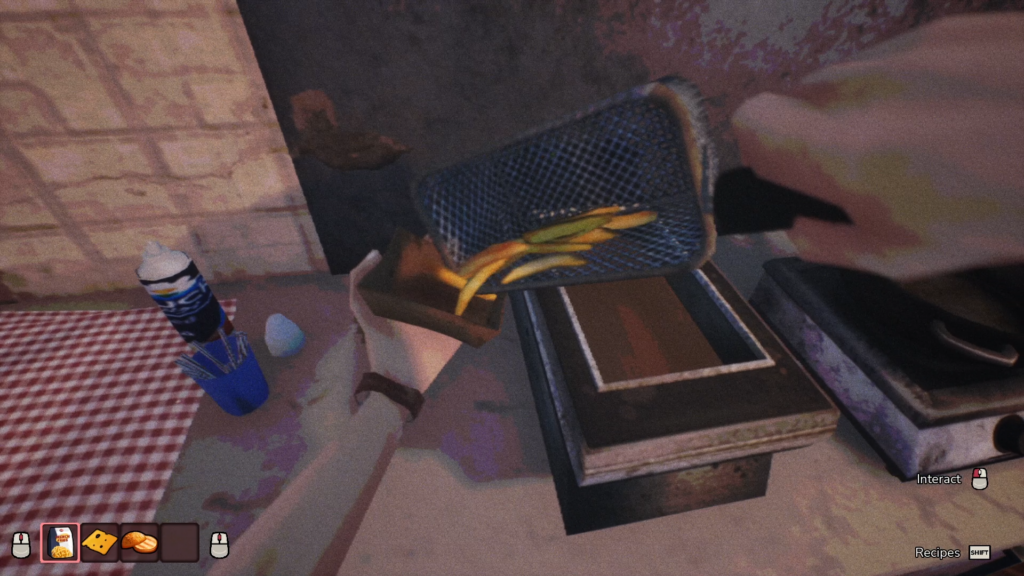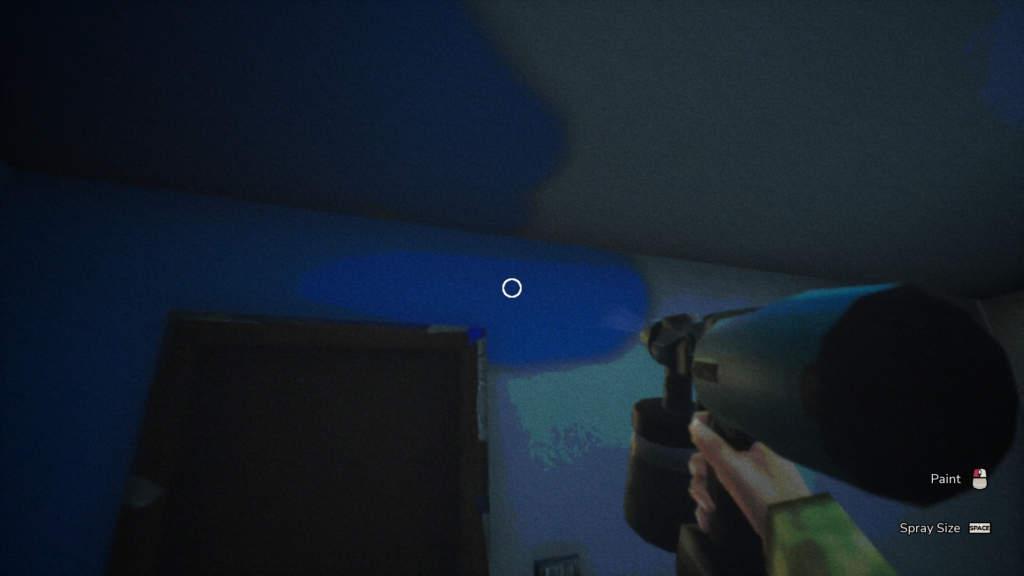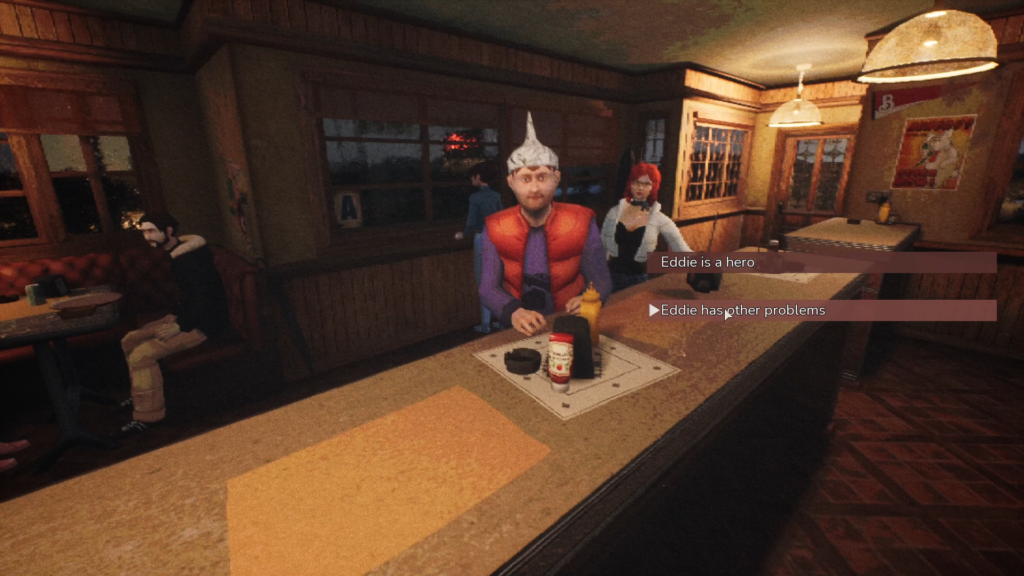Usually, short and sweet narrative focused games are my jam. Everyone has already gushed about Journey, but I’ve also found love for games like it over the last decade; Virginia, Jusant, Abzu, Gone Home, Indika, etc. I’ve even reviewed one on this very site before that I would still highly recommend, it even has a steam release now. But unfortunately, I struggled to find the same satisfaction from While We Wait Here.
While We Wait Here is a Quasi-Cooking-Management game sprinkled with dashes of equal parts horror and character drama. Through your decisions in the prologue, you will put in the shoes of either Nora or Cliff, co-owners of a small highway diner. It’s not long before you’re shown signs that there is some nondescript apocalypse that has doomed everyone on the horizon. But your role is not to escape, or avert the apocalypse, your only role is to take your customer’s orders, cook for them, and chat with them about their issues while it gets slowly worse outside the diner.
The gameplay is a really mixed bag. It’s split between three loops – taking and cooking orders, conversations with customers, and little character-focused vignettes; some of which have their own mechanic. Doing orders is incredibly satisfying, and is cleverly used at points to load in the main space in a different state to show the passage of time while you’re off to the pantry to get ingredients. By the end I had a good rhythm of how I juggled orders and got them to customers. The game is very forgiving, you can’t fail cooking, and there’s no timer. The only issue though, is that some of the ui and interactions have a feeling of jank to them. Want to serve someone with food or drink? Just click on them with the food, fine that makes sense. Want to pour a drink in the cup you just poured for them? You also click on them, not the cup, which feels counter intuitive. I also found that when you’re taking orders or talking to customers, if you’re not in the exact spot the game wants you to be, it’ll just phase you through level geometry if need be so it can move you there. Overall, it adds a very satisfying, yet janky palette cleanser of gameplay between the more surreal vignettes.

Speaking of which, these vignettes vary wildly in their quality. In one you might be smashing some guy’s car, exploring a cave, or painting your baby-to-be’s bedroom. These settings in of themself aren’t the issue, but their pacing and unique mechanics sometimes let it down. For instance, there is one vignette where you play as an older gentleman who is looking for his stolen cow who was taken into some dark caves. In this section, you keep having control of the camera ripped away from you as the old man looks around a new cavern or fork in the path. An intrusive button prompt will ask you to call for your cow before full control is given back to you.
Pacing is a constant issue for the game. Sometimes the game will only let you progress by doing tasks in a certain order, even when it feels like it shouldn’t matter. It also doesn’t help that even when cooking, control is constantly taken away from you at every step of the process as another canned animation plays. You can’t help but wonder if some of these animations could’ve been made to play a little quicker, or if they could’ve traded some of the game’s realism for some of these actions to happen without taking away control. Some of these vignettes also take what feels like forever to complete and detract from the main story in the diner- there’s one where you are painting your daughters room, and I just kept painting and painting, wondering when the game was going to move, until another intrusive button prompt came up asking me to stop painting to read a letter that had been in my pocket the entire time. I understand that the game is trying to insert a certain amount of symbolism and metaphor into the game, but that symbolism should only ever enhance the experience, not impede it like it does here.

Speaking of which, the story is a complete bust- which is a pretty big failure for a game like this. It starts off really interesting, but then dialogue choices are often unimportant. But even when they are, it’s really easy to lock yourself into an unsatisfying ending. Essentially, this game’s ending will be a combination of epilogues for each character based on what you tell them. If you tell them to do the same thing about their situation, both when they bring it up in the first half of the game AND in the second half, they will take your advice and an epilogue will show for them at the end.
But let’s say that you learn more about them after making the first decision, which you will because when they first ask for advice you know very little about them, and you learn more about their situation. Let’s also assume that maybe, upon reflection, your first recommendation doesn’t feel right, and you want to encourage them to take the second option. In doing that, you have just locked yourself out of any epilogue at all for that character. Instead, they will complain that you’ve only made them confused, damn you for having a sense of nuance because now they have no clue what to do. This is doubly-unfortunate, because these epilogues make up 95% of the ending for the story.

Nora and Cliff’s own story is mostly the subject of hallucinations and symbolism, that in the end, feel disjointed and come to an incredibly abrupt end no matter what your choices were.
Herein lies the biggest problem though; no matter what combination of epilogues you get, or which ending you get for Nora and Cliff, the ending is incredibly abrupt and will leave you in confusion. Next to nothing is explained as to what happened to these characters, and even the epilogues themselves are a few seconds long. So when the credits come up, you’re left with this feeling of “wait, that’s it?”. Even the apocalypse itself is mostly swept under the rug, and barely acknowledged in these endings, despite some aspects of it being shown to be rooted in reality.
This game is not bereft of good ideas. I think at the root of it, the cooking is incredibly fun, and with the intrusive hand animations removed, I’d be quite happy to play an endless mode in this diner. But that’s not what this game is. It feels like the developers are trying to tell a symbolic story about loss and change with the gameplay as a concession to get us through the door as players. It’s just a shame that this story isn’t satisfying, and loses all it’s impact through a rushed and incomplete feeling ending. Keep driving honey, this is a diner you don’t want to stop for.









